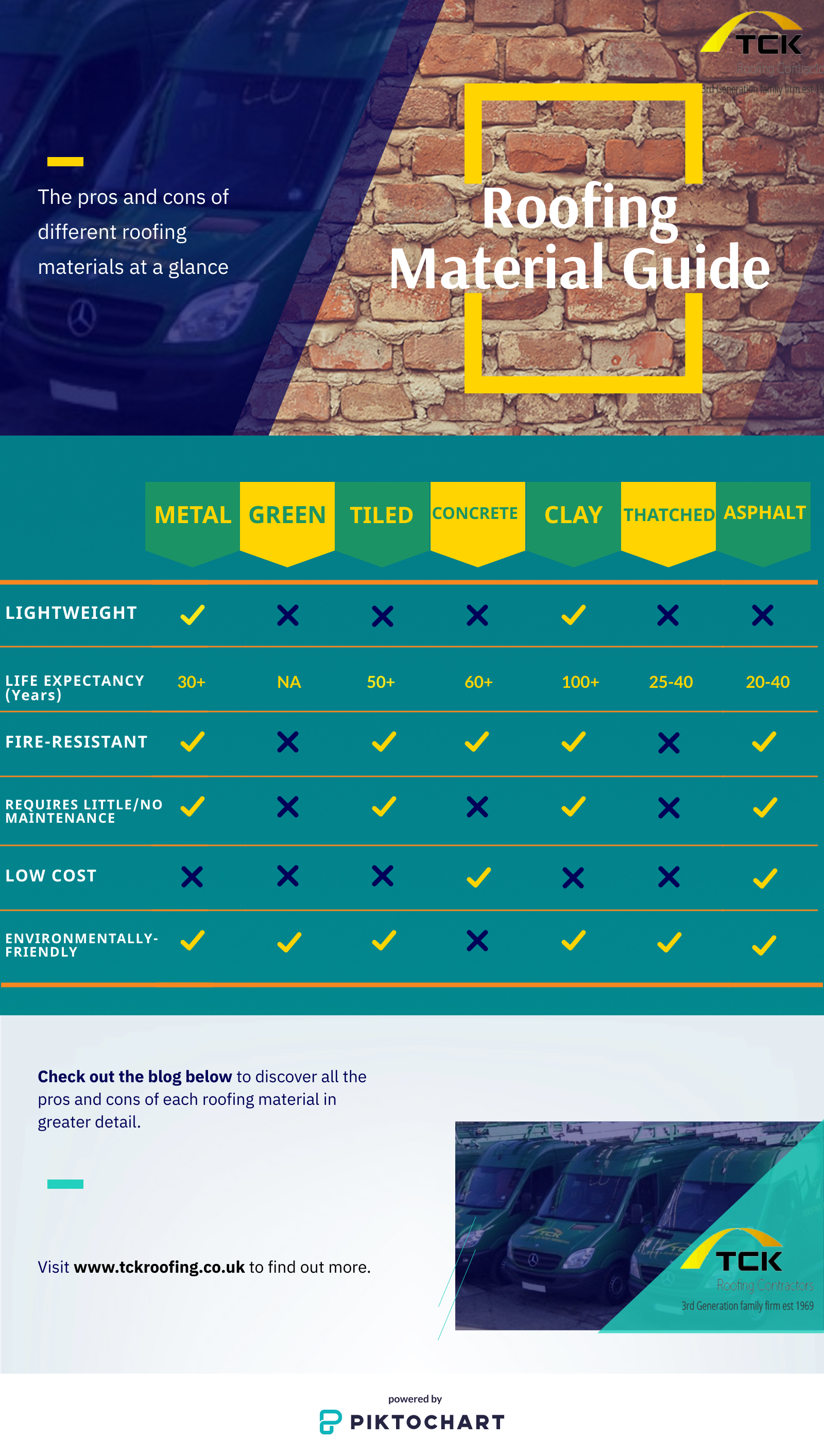TCK Roofing Contractors
Roofing Material Guide

In addition to the various types and sizes, roofs also come in many different materials. From thatched roofs to metal roofs, tiled roofs to green roofs, the options today are vast.
Each roofing material has various advantages and disadvantages.
The following guide will serve to highlight the pros and cons of each material and make your purchasing decision a whole lot easier.
Benefits and Disadvantages of Metal Roofing
Thanks to increasing availability, metal roofing can be found on many conventional properties, in addition to high-end luxury homes. Zinc roofing, slate roofing and copper roofing are all examples of metal roofing.
Pros:
- Metal is lightweight, so it can be applied to roofs that have a low load-bearing capacity
- Has a 30+ year life expectancy
- Fire-resistant
- Distinctive contemporary look
- Can be manufactured into any shape or design
- Requires almost no maintenance
Cons:
- Can be expensive compared to alternative materials
- Collects a lot of heat and can make your home uncomfortably warm
- Is easily dented by hail and other heavy falling objects
Benefits and Disadvantages of Green Roofing
Green roofs are an eco-friendly altewrnative to modern roofing options. They are either partially or completely covered in vegetation and plants, and provide a range of benefits, including a unique green aesthetic.
Pros:
- Unique visual dimension
- Sound insulation
- Temperature regulation
- Improved air quality
- Rainwater retention
- Increased biodiversity
Cons:
- They require a lot of regular maintenance
- Because green roofing is so new, life expectancy is as yet unproven
- Heavier and require more structural support to be implemented
- Relatively expensive
Benefits and Disadvantages of Tiled Roofing
Roof tiles are traditionally made out of locally-available materials. Two of the most popular roof tile materials are concrete and clay, but terracotta and slate are also common.
Pros:
- Requires little maintenance
- Fire-resistant
- 50+ years life expectancy
- Distinctive styles and colours
- Impervious to rot and insect damage
- Environmentally friendly
Cons:
- They are heavy; they require sufficient load-bearing capacity in the roof structure
- High cost
- Can be broken if they suffer a heavy impact
Benefits and Disadvantages of Concrete Roofing
Concrete roofing is available as individual tiles or one single solid slab. Many homeowners opt for tiles for the aesthetic, but solid concrete roofs are cheaper and easier to install.
Pros:
- Relatively inexpensive — concrete is cheaper compared to clay
- Extremely strong — can withstand intense wind and storms
- Resistant to wind uplift
Cons:
- The colour will fade over time
- It is very heavy and requires a roof structure with sufficient load-bearing capacity
Benefits and Disadvantages of Clay roofing
Another popular roof tile material, clay has been used in roofs for thousands of years. They have survived this long because of their timeless aesthetic.
Pros:
- Life expectancy of over 100 years.
- Extremely strong — can withstand intense wind and storms
- Impervious to rot and insect damage
- Requires little maintenance
- They can be recycled after removal, making them good for the environment
Cons:
- Difficult installation
- High cost
- Brittle
Benefits and Disadvantages of Thatched Roofing
Thatched roofing is common for cottages but will rarely be used in new builds. Most thatchers exist solely for restoration work.
Pros:
- Unique look
- Environmentally friendly
- Provides insulation
Cons:
- Expensive
- Requires frequent attention
- Not fire-resistant
Benefits and Disadvantages of Asphalt Shingles
Asphalt shingles are the most common type of roofing material. Despite their name, asphalt shingles contain very little asphalt — sometimes as low as 5%. Most of their composition is made up of mineral fibre and cementitious fillers.
Pros:
- Asphalt roofing is inexpensive
- Requires little to no maintenance compared to other material choices
- Fire-resistant
- Low cost
- Environmentally friendly
Cons:
- Subject to curling and splitting
- Lasts only between 20-40 years, which isn’t as much as alternatives
- Brittle when cold
- Heavy
For more information on the life expectancy of your roof, check out our guide here.
TCK Roofing & Building is a third-generation family-run roofing business, with over 55 years of experience. That offers a range of roofing services including; copper & lead roofing, green roofing, conservation roofing, emergency roof repairs, chimney repairs and restorations, new roof installations, guttering cleaning, roof inspections and surveys, fascias, soffits & cladding, velux & skylight installation.
To customers in Watford, Rickmansworth, Potters Bar, St Albans, Edgware, Harrow, Northwood, Pinner, Barnet, Finchley, Golders Green, Hampstead and beyond.
Why not contact TCK Roofing & Building for a free quote today, quality skilled tradesmen at unbeatable prices!
Our Certifications
Do you need more information?
Contact our friendly team today







